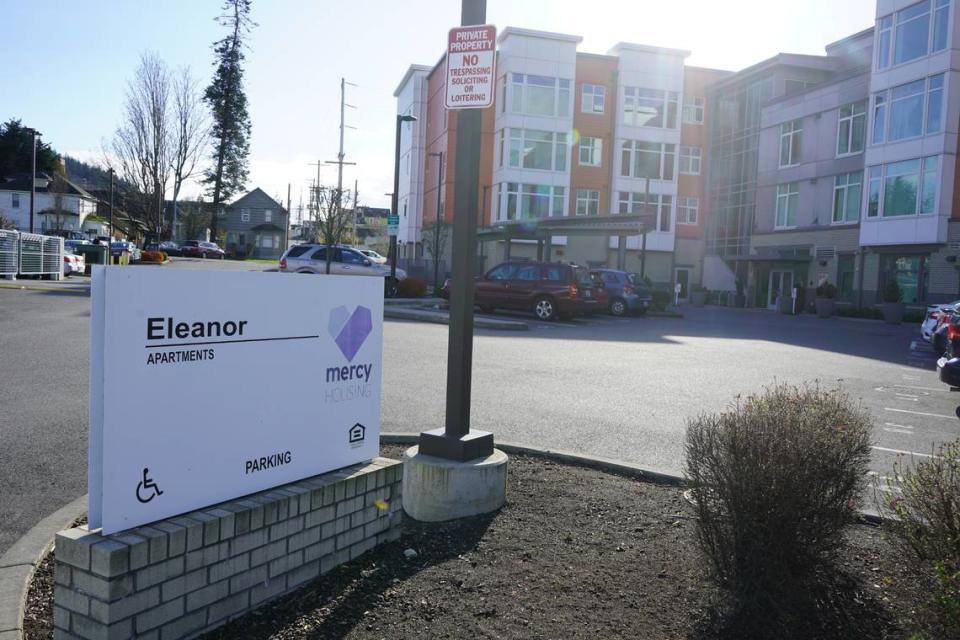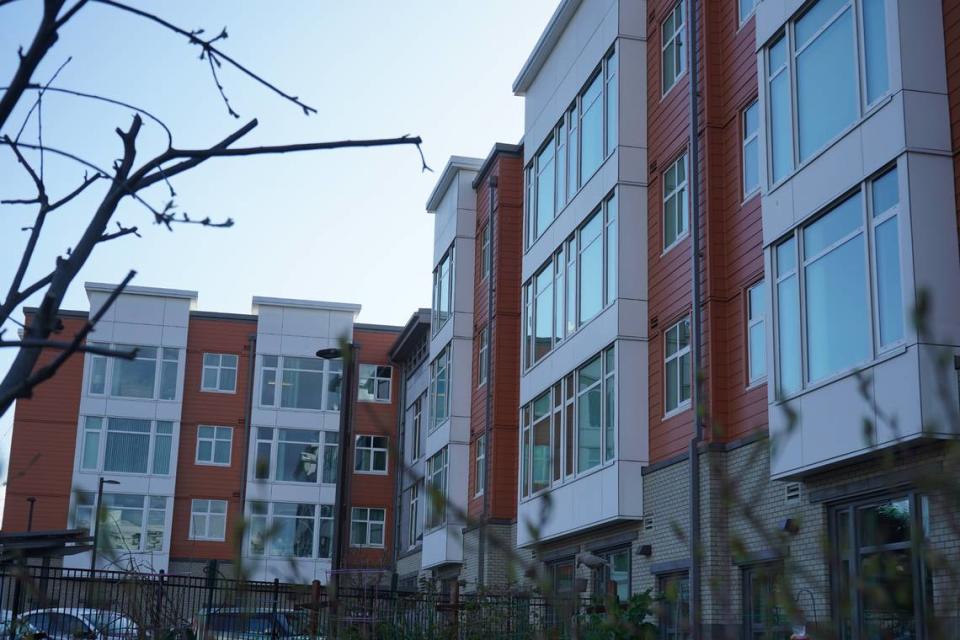‘I could be homeless.’ These Bellingham seniors fear being priced out of affordable homes
This is the first in The Bellingham Herald’s occasional series “At What Cost?”
Stan Betts is a resident at the Eleanor Apartments in downtown Bellingham. He and other residents are concerned about being priced out of the building due to rent increases.
He’s on a fixed income, like many other residents there receiving Social Security, and lives in one of 80 units built in 2017 that are advertised as affordable senior housing by Mercy Housing. The national nonprofit developer builds and manages affordable housing projects across the country, including Eleanor.
When Betts moved in a year and a half ago, his rent was $733 per month, which was more than 47% of his income. Due to rent increases, he is now paying $800 per month — more than 49% of his monthly income, even with a cost of living adjustment on his Social Security.
“For a market rate building, where people are employed, their incomes are flexible and they’ll get raises, that’s sustainable. But it’s not sustainable for anybody renting in our situation,” Betts said.
Rental prices are up for everyone, according to data from Zumper. But low-income seniors on Social Security are particularly vulnerable when their only opportunity for more money is through a cost-of-living adjustment. Those are meant to help seniors on a fixed income as inflation occurs, but those adjustments are based on federal inflation changes rather than area median income increases. Because Whatcom County’s area median income is higher than the national average, the cost-of-living adjustments don’t align with increases in rent.
Patty Dawn is another resident at the building living on a fixed income. Her rent was $614 when she moved in five and a half years ago. Her rent is now $800 — up about 31% in five years.
Rents at the Eleanor Apartments have increased almost every calendar year since the housing opened in 2017. Though, there was a 22-month period during the pandemic when the residents didn’t see an increase. The most recent boost, in September 2022, was 9%.
That increase led many residents, including Dawn, to apply for rental assistance through the Opportunity Council, which administers the Federal Emergency Rental Assistance program locally. Twenty residents at Eleanor currently have their rent fully covered by the program, according to the Opportunity Council, but that rental assistance is scheduled to end in June 2023. When Dawn’s assistance ends, she will pay about 40% of her income toward rent.
For now, some residents are cutting back on food costs, activities and medicine to make ends meet. Betts is concerned that if rent increases continue at this rate for the next five years, he and other residents in the building won’t be able to keep up with the costs. He doesn’t have other housing options.
“I could be homeless,” Betts told The Bellingham Herald.

Why is rent increasing?
Right now, half of the units at the Eleanor Apartments cost $469 per month and the other half cost $800 per month, up from $351 and $614, respectively, when the building opened in 2017. The units are priced for people making 30% and 50% of the area median income.
Mercy Housing Northwest President Joe Thompson cited inflation and rising costs for staffing, utilities, repairs, property taxes and insurance premiums as the reasons for the rent increases.
“Really, our main revenue source and way to mitigate (increasing operating costs) is the rent at the property. So in order for us to be able to continue to really operate our properties at a standard that we can be proud of, the Bellingham community can be proud of and the residents can be proud of, requires that we increase revenue via rent increases to cover some of those increasing operating costs,” Thompson said in an interview with The Herald.
Thompson said he did not yet know if Mercy would increase the rent at Eleanor in 2023. But residents will likely see another rent increase in 2024, he said.
Defining affordability
The current rental prices at the Eleanor Apartments are well below the current market rate of $1,495 per month for a one-bedroom apartment, according to Zumper. Still, Betts and Dawn both say the prices aren’t affordable — and the U.S. Department of Housing and Urban Development agrees with them.
The HUD defines affordable housing as housing for which the occupant is paying no more than 30% of gross income for housing costs, including utilities.
By that metric, many of the residents at the Eleanor are not living in housing that is affordable to them. Many residents told The Bellingham Herald they are spending upwards of 40% or 50% of their income on rent.
Many residents are also receiving extra assistance, with 22.5% of the households at the Eleanor, 18 units, receiving Section 8 vouchers, according to Thompson. This is federal housing assistance funding from the HUD that caps rent at no more than 30% of a household’s income. It’s granted by local public housing agencies to low-income families, those who are elderly and those with disabilities.
That funding is limited and the demand for assistance often exceeds the available resources. Applicants are often placed on long waiting lists even if they are eligible, according to the HUD.

Rent increase regulations
Eleanor Apartments are governed by the Low Income Housing Tax Credit Program that is overseen by the Washington State Housing Finance Commission. The program is meant to keep housing affordable for households at low to moderate income levels.
Every year, the program publishes a set of maximum allowable rents by the county based on the area median income. If the area median income goes up, so will the maximum allowable rents at housing projects governed by the program.
Thompson added that none of the 80 households at Eleanor are paying the maximum allowable rent. Instead of the $469 and $800 monthly rents that Mercy is charging tenants, the nonprofit could be charging $510 and $850, respectively.
“In counties like Whatcom County that are booming, those maximum allowable rents tend to go up,” Thompson said.
Mercy Housing isn’t required to increase the rent, though the nonprofit typically does.
“To not (raise the rent) is a strategy that is not in the best interest of that property, the community, or its residents in the long term because, again, we’re not going to be able to maintain that property to the standard that it needs to be maintained at,” Thompson told The Herald.
Mercy tries to help residents with rental increases by providing resident services at their properties, according to Thompson. It’s meant to help residents identify and apply for public funding benefits and rental assistance, among other things. Residents at the Eleanor haven’t had an on-site resident services provider since December, but have been receiving help from other property advisors in the meantime, Thompson told The Herald.
Services, city solutions
At an April 10 city of Bellingham Community and Economic Development Committee informational meeting about financing, constructing and operating affordable housing developments, the City Council discussed the issue of seniors getting priced out of their housing at Eleanor with Mercy Housing and the Department of Planning and Community Development.
“How do we bridge that difference going forward? That gap is getting bigger for (the residents at Eleanor) and some of those people aren’t going to be able to stay. Then where do they go?” asked Bellingham City Council member Lisa Anderson at the meeting.
The city of Bellingham’s five-year Consolidated Plan in part outlines the challenge of vulnerable, low-income senior communities. The plan will go into effect in June as a condition of receiving federal grants from HUD. The plan provides an assessment of the city’s community development needs and an analysis of the housing market for low-income households. It also presents goals for addressing those needs with resources, services and funding.
Reducing housing cost burdens, helping people stay in their housing and helping people meet their basic needs are all plan goals.
But the challenge the tenants at the Eleanor face will be an ongoing discussion as the city decides how to manage and disperse funding. At the meeting, council members discussed the possibility of further subsidizing tenants’ rent but no concrete decisions were made.
Do you have a story to tell about renting, buying or building Whatcom County housing? Reporters Rachel Showalter and Robert Mittendorf invite your comments at newsroom@bellinghamherald.com.

